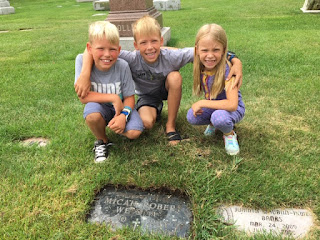We live in unprecedented times. Our schools, jobs, and churches are all
physically closed. Our family members
are sick and might even be dying, with no help on the immediate horizon for a
vaccine for the COVID-19 coronavirus.
Many of us have lost jobs or, if we have not lost our job, have taken
pay cuts and are forced to work from home.
There, we try to keep our careers afloat while also trying to manage the
education of our children under less than ideal learning environments.
We are experiencing, to a lesser extent, what the disciples
felt on that “Easter Saturday.” Six days
prior, their long-awaited savior had entered Jerusalem on Palm Sunday to the
accolades of the Jewish onlookers, those who hoped in Jesus as their long-awaited
political savior. In the span of a few
short days, all of the hopes of those closest to Jesus were dashed. We
might try to imagine just how devastated those disciples felt that
Saturday. They put all their “eggs in
one basket” and, when their Savior breathed his last breath on that dark Friday
afternoon, they felt like they lost everything.
With the benefit of scripture and history, we can see how much the
disciples “missed” when it came to the prophecies of Jesus’s resurrection, both
from the Old Testament prophets as well as Jesus himself. Yet we are similarly caught in the historical
moment, grieving the loss of what we had assumed to be ours; certain, or at
least predictable, outcomes for our family, our careers, and our finances.
In these most difficult of times, God calls us to trust him for
the health of our family, for our career and finances and even the educational
outcomes of our kids. We must trust him
for the fact the He will provide, even though we can’t presently see how He will
provide. The Bible says that God’s
riches and wisdom are so deep, that his judgements are “unsearchable” and that
his ways are beyond “tracing out.” Romans
11:33. While we won’t understand all of
God’s ways, that does not mean that there are not good and noble purposes being
achieved through our present circumstances.
In the book of Job, we see a righteous man lose it all--his
family, his fortune, and even his health.
Job expresses his grievances
against God for God’s plan, a plan that while we can see through the Biblical
narrative, Job was never granted access to.
As God came to Job in the whirlwind, God reminded Job to whom it was,
precisely, that Job was airing his grievances.
None of us built the universe, including its gravitational forces, all
living beings therein, and even the corona virus itself. We cannot see how time and space interact; we
cannot see the end from the beginning.
(Job 38-41). While God ultimately
provided Job another family, his fortune and his health, he was never given
access to God’s plan for his life.
Since we are within time and space, we can not be so
presumptuous as to believe that we know the outcome of our present difficulties.
Should not the COVID-19 crises alert us to the very dependency on God that our
life circumstanced had heretofore masked?
Is it possible that God wants to do something through our professional
and family life to achieve an outcome more eternally significant than the
outcome we planned for ourselves and our family?
Earlier today, we made our annual “easter weekend” visit to
Micah’s cemetery. There, we talked to our
living kids about death, grief, and what it might mean to be resurrected when
Christ comes again. Certainly, these precious
gospel opportunities might have been
created through other means had Micah not died.
But if any one of our living child’s faith journey, or anyone else’s
faith journey, has been positively impacted by the story of our deceased
Micah, it will redound to God’s glory in
orchestrating such an outcome through Micah’s death. We live in the hope that a thousand, or
perhaps even a hundred thousand, such gospel opportunities will, in the end,
demonstrate the goodness of God in orchestrating a life and death that is
otherwise difficult to accept.
But regardless of whether we find any circumstantial
blessings to our present sufferings, we must immerse ourselves in the promises
of scripture so that we can live in the joy of our eternal significance. After all, COVID-19 has taken nothing
from us that is of eternal significance.
If we focus exclusively on the loss of our income, relationships and
physical opportunities, we will miss these opportunities to focus on our eternal
blessings that cannot be lost. 1 Peter
1: 3-6 says, “Blessed be the God and Father of our Lord Jesus Christ! By his great mercy He has given us new birth
into a living hope through the resurrection of Jesus Christ from the dead, and
into an inheritance that is imperishable, undefiled, and unfading, reserved in
heaven for you, who through faith are shielded by God’s power for the salvation
that is ready to be revealed in the last time.”
On Easter Saturday, the disciples needed to wait upon the
Lord only for a few short hours before their hopes and dreams were realized
with the empty tomb, with Jesus Christ resurrected. In our case, how long will we need to
wait? Whether for a few hours or a
lifetime, let us pray and wait in hope, knowing that, as has often been said,
“It is Friday, but Sunday is coming!”
Happy Easter to you and your family from the Wessman household.



